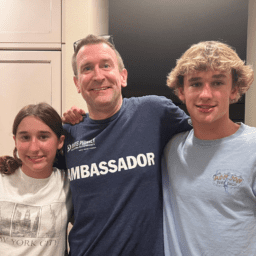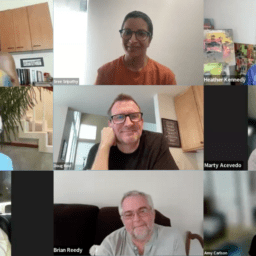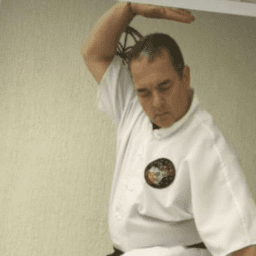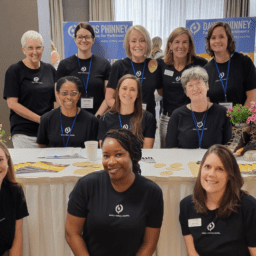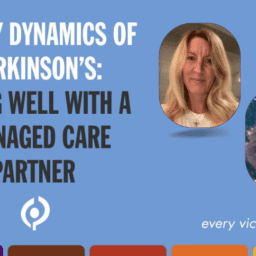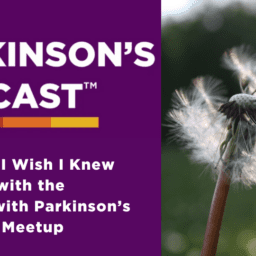Written by Allan Cole, PhD
It’s the fall of 2016. I’m 48 years old, and words from a man I have only just met prompts what feels like an out-of-body experience — becoming as much an observer of what is happening to me as a participant in it. “What worries me is that I think you are in the early stages of Parkinson’s,” the doctor says, and everything slows as if I am watching someone else’s nightmare unfold while listening to a record spinning at a sluggish speed. Things get blurry, too, and slowly the room begins to spin. I grab hold of the hard wooden chair I am sitting in, hoping to keep my breakfast down. “But I have young children…”, I say.
Life changed profoundly at that moment in a neurologist’s office, as it does for approximately 60,000 people each year in the United States alone who receive a Parkinson’s diagnosis. A portion of them, approximately four percent, will be under the age of 50. They will be said to have young onset Parkinson’s, which brings a unique set of challenges, especially because they typically will still be working and, in many cases, will still have children in the home.
Looking back on this moment nearly five years later, I feel and know so many things that I wish I could share with my newly diagnosed self. Here are a few of them.
 #1 – Breathe!
#1 – Breathe!
A Parkinson’s diagnosis can feel overwhelming, and understandably so. Parkinson’s disrupts life and plans for the future; and it can threaten one’s sense of security, whether in terms of work and finances, relationships, or one’s identity or sense of self as a healthy person. For all of these reasons, it’s important to take a breath, literally and figuratively speaking. To calm down, and to begin coming to terms with Parkinson’s by recalling that it’s not a death sentence. (Life expectancy is nearly what it would be if you did not have Parkinson’s.) Moreover, progression typically is slow, especially in younger people. You will have time to adjust to your new normal.
 #2 – Decide when and how to share news of your diagnosis with others.
#2 – Decide when and how to share news of your diagnosis with others.
One of the first questions many of us have is whom we should tell we have Parkinson’s. Several people I know have kept their Parkinson’s diagnosis private, some for a long time. For some, there may be good reasons to keep a diagnosis private. After all, Parkinson’s can come with all sorts of misperceptions, naivety, and flat-out wrong assumptions about what it will mean for a person’s future. However, this silence can take a toll. You likely will have to work hard to camouflage or explain away symptoms, hiding something that has become a central part of your life.
For the first 10 months after my diagnosis, I stayed silent about it. All the while, I felt disingenuous and inauthentic. It was as if I were cheating on people I care about while also being unfaithful to myself, and this became more painful than having Parkinson’s. However, when I began sharing my diagnosis, I felt not only relieved but empowered to live a good life with Parkinson’s. Just as importantly, being open about my condition helped me meet others living with Parkinson’s. I have never regretted the decision to live openly with Parkinson’s; I just wish I had begun doing so sooner.
#3 – Find your People with Parkinson’s as soon as possible.
This brings me to the next piece of advice I would have given to my newly diagnosed self: find your people as soon as possible! One of the great gifts I have experienced because of Parkinson’s is the extraordinary group of people I have met. People with Parkinson’s have offered me comfort, encouragement, hope, and humor, and their support has helped me feel not only more empowered but more connected with other people, too. This connection is key. We need each other to live well with Parkinson’s.
 #4 – Your career is not over, but still, speak to an employment attorney.
#4 – Your career is not over, but still, speak to an employment attorney.
This brings me to a practical matter: I urge you to meet with an employment attorney before going public with your diagnosis. This kind of consultation should be part of your discernment process. You will benefit from knowing your rights as well as your employer’s responsibilities if you run into problematic responses. You want to make the most informed decisions you can concerning living publicly with Parkinson’s, including at work. Remember that the law is on your side concerning your job and knowing as much as possible about that can provide a measure of comfort and security.
#5 – Life can still be good.
Living with Parkinson’s can be difficult, especially as it progresses, but life can still be good. I have found that having Parkinson’s can provide opportunities for growth — personal, relational, and spiritual — and that living with Parkinson’s presents opportunities for newfound meaning and deeper, more authentic relationships. Until we find a cure for Parkinson’s, none of us can change our status as a person with Parkinson’s. However, we can choose how we live with it, what we do with it. We decide whether it becomes a source of despair or empowerment as we live in solidarity with other people with Parkinson’s, our care partners and families, and our larger networks of advocacy and support. We can boost one another and use our collective voices for making others’ lives better, which makes our own lives better, too.
 It’s now been more than four years since my neurologist’s sixteen words changed my life. At almost 53 years old, I now live more calmly and with a lot more knowledge about Parkinson’s. I have a clearer perspective on how to experience the fullness of life, with a lot of joy and hope even amid the daily challenges that the Parkinson’s Beast throws down. My children are now teenagers, and we have integrated Parkinson’s into our family life. It’s making all of us more resilient, compassionate, and grateful for what we have, both despite Parkinson’s and because of it.
It’s now been more than four years since my neurologist’s sixteen words changed my life. At almost 53 years old, I now live more calmly and with a lot more knowledge about Parkinson’s. I have a clearer perspective on how to experience the fullness of life, with a lot of joy and hope even amid the daily challenges that the Parkinson’s Beast throws down. My children are now teenagers, and we have integrated Parkinson’s into our family life. It’s making all of us more resilient, compassionate, and grateful for what we have, both despite Parkinson’s and because of it.
Learn more
Allan mentions a lot of great advice as to steps to take after receiving your diagnosis. To help you feel confident in taking these steps, we’ve provided you with some additional resources below to help.
How To Share Your Diagnosis with Friends and Family
Should I Tell My Employer I Have Parkinson’s?
Find An Employment Lawyer Near You
Stories to inspire you to live well with Parkinson’s
Find your community with the help of a Davis Phinney Ambassador






